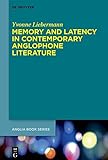Memory and Latency in Contemporary Anglophone Literature / Yvonne Liebermann.
Material type: TextSeries: Buchreihe der Anglia / Anglia Book Series ; 81Publisher: Berlin ; Boston : De Gruyter, [2023]Copyright date: ©2023Description: 1 online resource (VIII, 283 p.)Content type:
TextSeries: Buchreihe der Anglia / Anglia Book Series ; 81Publisher: Berlin ; Boston : De Gruyter, [2023]Copyright date: ©2023Description: 1 online resource (VIII, 283 p.)Content type: - 9783111063584
- 9783111067780
- 9783111067384
- 823.009353 23/eng/20230615
- PR481 .L54 2023
- online - DeGruyter
- Issued also in print.
| Item type | Current library | Call number | URL | Status | Notes | Barcode | |
|---|---|---|---|---|---|---|---|
 eBook
eBook
|
Biblioteca "Angelicum" Pont. Univ. S.Tommaso d'Aquino Nuvola online | online - DeGruyter (Browse shelf(Opens below)) | Online access | Not for loan (Accesso limitato) | Accesso per gli utenti autorizzati / Access for authorized users | (dgr)9783111067384 |
Frontmatter -- Acknowledgements -- Contents -- 1 Introduction: Latency as a Mode of Memory -- 2 Memory – Latency – Eventfulness -- 3 Being Notably Absent: Uneventfulness and Digression in J.M. Coetzee’s The Childhood of Jesus (2013) -- 4 Idiorrhythm in Teju Cole’s Open City (2011) -- 5 Non-Evental Multiperspectivity: Column McCann’s Let the Great World Spin (2009) -- 6 “Places are Ghosts, too”: Yvonne Owuor’s Dust (2014) -- 7 Re-Membering Modernism: Anna Burns’ Milkman (2018) -- 8 Remembering Britain’s Lost Children: The Myth of Filiation in Caryl Phillips’ The Lost Child (2015) -- 9 Conclusion -- Works Cited -- Index
restricted access online access with authorization star
http://purl.org/coar/access_right/c_16ec
Up until fairly recently, memory used to be mainly considered within the frames of the nation and related mechanisms of group identity. Building on mechanisms of inclusion and exclusion, this form of memory focused on the event as a central category of meaning making. Taking its cue from a number of Anglophone novels, this book examines the indeterminate traces of memories in literary texts that are not overtly concerned with memory but still latently informed by the past. More concretely, it analyzes novels that do not directly address memories and do not focus on the event as a central meaning making category. Relegating memory to the realm of the latent, that is the not-directly-graspable dimensions of a text, the novels that this book analyses withdraw from overt memory discourses and create new ways of re-membering that refigure the temporal tripartite of past, present and future and negotiate what is ‘memorable’ in the first place. Combining the analysis of the novels’ overall structure with close readings of selected passages, this book links latency as a mode of memory with the productive agency of formal literary devices that work both on the micro and macro level, activating readers to challenge their learned ways of reading for memory.
Issued also in print.
Mode of access: Internet via World Wide Web.
In English.
Description based on online resource; title from PDF title page (publisher's Web site, viewed 25. Jun 2024)


